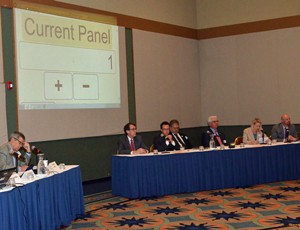The public hearing in Kansas City, Kansas last week on EPA’s proposed volume obligations under the Renewable Fuel Standard was a who’s who of the biofuels industry and then some.
 A total of 254 people on 43 panels testified in two different rooms for about seven and a half hours. It was over twice as many people who testified at a public hearing in Arlington, Virginia in December 2013 on EPA’s first proposed RVO for 2014 that was ultimately withdrawn.
A total of 254 people on 43 panels testified in two different rooms for about seven and a half hours. It was over twice as many people who testified at a public hearing in Arlington, Virginia in December 2013 on EPA’s first proposed RVO for 2014 that was ultimately withdrawn.
The vast majority of those testifying at the hearing were biofuels supporters, less than a dozen represented the oil industry or others opposed to increasing use of biofuels. Ethanol and biodiesel producers, corn growers, agribusiness interests and fuel retailers from across the nation testified, in addition to several state lawmakers, two governors and their agriculture secretaries.
The very first panel consisted of representatives from the American Coalition for Ethanol (ACE), American Fuel and Petrochemical Manufacturers, American Soybean Association, National Farmers Union, National Biodiesel Board and the Renewable Fuels Association (RFA).
RFA senior vice president Geoff Cooper urged the agency to implement the statute as Congress intended and abandon its blend wall methodology in setting the 2014–2016 renewable volume obligations.
“We continue to believe EPA is overstepping the bounds of its legal authority by proposing to partially waive the RFS based on perceived distribution capacity constraints,” Cooper said. “Nothing in the statute allows EPA to set the renewable volume obligations (RVOs) based on the so-called ‘blend wall’ or alleged infrastructure limitations. Congress considered measures that would have allowed waivers based on distribution infrastructure. But they rejected those concepts because they knew allowing such off-ramps would allow oil companies to hold the RFS program hostage.”
Listen to Cooper and others on the first panel here: EPA RFS Hearing panel 1


